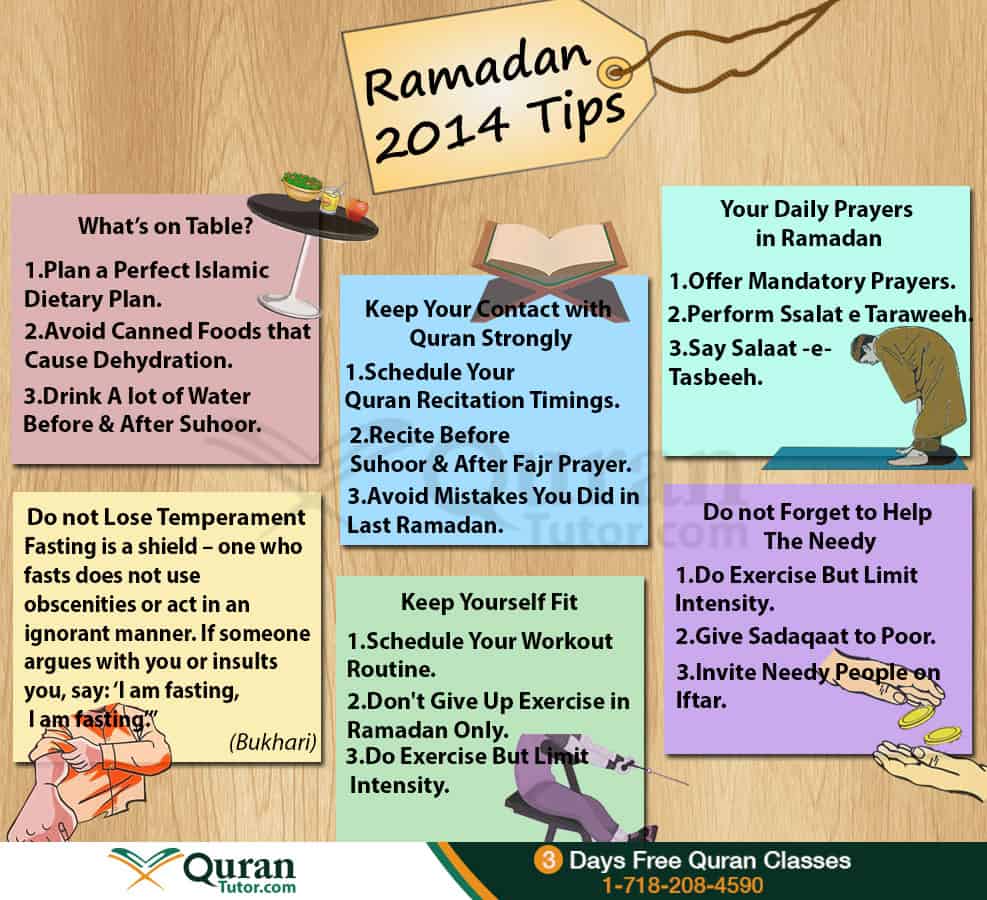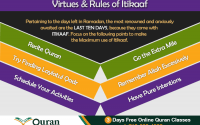Fasting in Ramadan 2015 – Tips and Rules to Get Maximum Blessings
When is Ramadan in 2015? People have already started searching about the Ramadan 2015 which highlights the significanceof this holy month of fasting. While exact dates cannot be predicted, estimating can lead to a fair conclusion. Ramadan 2015 will probably be starting after mid of June, to be exact 18th or 19th of June and will end at 16th or 19th of July, 2015.
Since it is one of the blessed months and has greater significance, getting ready for the morning and evening meals and other religious Ibadat is what most Muslims will be looking for these days. This post highlights some of the useful small Tips that all Muslims can easily use to earn higher rewards during the blessed month of fasting.

What’s on Table?
From butter to the bread, dates to the grapes, spicy meals and snacks, all eatables and luscious dishes become the part of Ramadan Suhoor and Iftar meals. But, you are advised to follow a proper meal plan to ensure healthy diet. Islamic dietary plan is what permissible to follow which would not only bring taste on the table, but will ensure your fitness too. In this regard, following are the general guidelines you must be taking care of regarding your fasting meals:
Suhoor – Predawn Meal:
- To endure the hotness of this summer Ramadan, you are advised to drink a lot of water at Suhoor time. This would help you retain your water level all through day.
- Some good predawn meals include: protein shake, natural peanut butter, fibrous vegetables that develop a feeling of fullness, olive oil.etc
- Requirements of key nutrients and maintaining them must be your prime motive to be able to spend all day without eating anything. For that, taking food that comprises off solid multi-vitamin and multi mineral vitamin in the Suhoor time would greatly benefit.
- Also, be careful regarding your sodium intake. Avoid eating food such as soups, sauces, and canned meats that contain high-level of sodium and will cause greater dehydration.
Iftar – Breaking of the Fast
- Following the Sunnah at the time of breaking the fast is the way to start. Break your fast with dates, milk, fruit juice, or water. Drinking juices or eating drink after a long day of fasting, brings the fluid and blood level up to the recommended mark.
- Do not overeat. Perhaps, taking a balanced dinner after Maghrib prayer is recommended.
- Avoid eating chocolates and precooked products from food stores that would imbalance your dietary plan, and may cause disturbance while fasting. Instead, there is a range of sweet and scrumptious fruits available in this season that are far better than chocolates.
- Keep drinking plenty of water on the table and after dinner to balance the water level.
Note – Though these tips are recommended in any case, yet Muslims having health issues, are advised to take their doctors or physician expert advice.
Recommended Reading – How to Bring Taste on the Table – Suhoor & Iftar Tips
Keep Your Contact with Quran Strongly
All Muslims must know the fact that Ramadan is the month in which the Holy Quran was revealed. Therefore, both Ramadan and Quran have strong connection.
As per saying of Holy Prophet Muhammad (P.B.U.H), The Quran is either a proof for you or against you.”
(Saheeh Muslim, book of wudhu, Chapter-the virtues of wudhu)
Quran and Ramadan will witness the one who recites the Quran and fasts during Ramadan and they will shield him/her from the fire of hell at the Day of Judgment. Therefore, it is strongly suggested to develop a habit of Quran Reading that would not only make your holy month spiritual but will help you in carrying the same spirit all through year. Regarding this, here are some recommended tips you can follow in order to make best use of Ramadan with Quran:
- Devise a Quran reading plan to follow in the entire month. Choose a hassle free time of the day when you are fresh and brain is empty of days’ worries. Wake up early to read some portion of Quran before predawn meal (Suhoor) and after the Fajr Prayer. Starting off your day with recitation of Quran is an ultimate spiritual beginning.
- Think of the mistakes that became the actual reason why you were unable to recite the Quran in previous Ramadans. Make a strong commitment to not to repeat them in this Ramadan.
- Before Suhoor, After Salaah, and Before Sleep are also considerable times of the day when you can recite the Quran.
In addition to these, Ramadan is the month in which environment around us is filled with spiritual and religious fervor, which opens an opportunity for a person, who does not know how to read Quran, to start learning the divine book. To help such Muslims take advantage of this opportunity, QuranTutor.com offers Quran tutoring classes online. So if you are someone interested to learn to read Quran with perfect pronunciation, register with QuranTutor.com.
Recommended Reading – How to Develop Strong Connection with Quran in Ramadan
Your Daily Prayers in Ramadan
Besides making a strong contact with the divine book, there are other Ibadaat’s (Prayers) you can perform on daily basis to make an even stronger contact with the Lord. Therefore, in this holy month, you are suggested to plan a schedule in which you would better be able to perform the following prayers daily:
- Offer your Mandatory Prayers Regularly 5 Times
- Perform Salat e Taraweeh at Night
- Offer Additional Nawafil to Seek the Blessings of Allah Almighty
- Offer Salat e Tasbeeh, if not daily, perform on Weekly Basis
However, while these are recommended prayers, it is strongly suggested not to excessively elongate your standings at night or praying while fasting because it can be costly to your health. Keep a balanced schedule that will allow you to perform both religious as well as personal activities without upsetting yourself.
Recommended Reading – Daily Prayers You can Offer in Ramadan
Do not Lose Temperament
This year, the month of fasting will be a big test because of summer. In the sizzling days without having to eat or drink anything, keeping the cool becomes next to impossible for many especially those who are short on temperament. For such people, it is advised to control their anger and be flexible enough to tolerate, as there is a greater reward for patience and showing good conduct. The Holy Prophet Muhammad (P.B.U.H) said:
The Prophet (peace be upon him) said: “Fasting is a shield – one who fasts does not use obscenities or act in an ignorant manner. If someone argues with you or insults you, say: ‘I am fasting, I am fasting’.” [Sahîh al-Bukhârî (1795)
This is the perfect tip of combating your anger and keeping calm while fasting. To further keeping on calm and relieving your nerves from stress, we recommend you to read tips for relieving your nerves and controlling anxiety.
Recommended Reading – Muslims Way of Dealing with Depression and Stress
Keep Yourself Fit
Ramadan comes up with a routine change, which most people find hard to adjust with. Especially those, who are fitness conscious and do regular exercises, look to plan out a proper fitness regime. Here are some generic guidelines to follow in this regard:
- People, who do exercise regularly, are often found of giving up this practice in the month of Ramadan. Doing this is not permissible, as after Ramadan, it will rather become hard to continue this practice. Perhaps, the better option would be to do exercise as per your daily routine but reduce the intensity of workout. Do exercise but alter your practice timings and minimize the activities.
- Since you would still be doing workout in Ramadan, it becomes imperative to keep a check on your carbohydrates and protein intake.
- You can also opt for altering your schedule of exercising. Miss out the morning time, and do exercise after Iftaar.
Recommended Reading – Nutrition And Fitness Regime For The Month Of Ramadan
Become Closer to Allah
Allah says: ‘Every deed of the son of Adam is for him except fasting; it is for Me and I shall reward for it…’” [Al-Bukhaari 1761]. This saying of Holy Prophet Muhammad (S.A.W) clearly illustrates the objective of fasting in the month of Ramadan. Ramadan is the month of Allah and a day spent well while keeping fast will bring higher rewards to you. Although we have discussed prayers, you can perform daily to seek forgiveness from Allah, but there are more to it. One ultimate way of seeking this direct reward from Allah, is to start practicing the true guidelines given by Him to get closer to the Almighty. Remember, those who walk with directions given by Allah, always reach their destination. And Ramadan is the best month in which the environment across the board is religious making it a lot easier to embed these principles in yourself.
Recommended Reading – Top Tips for Becoming Special and Closer to Allah Almighty
Follow the Prophet’s Way
Ever wondered about how did Prophet Muhammad (P.B.U.H) used to spend His month of fasting. Most of us generally do not ponder about this point. However, the ultimate way to make most out of Ramadan is to do things The Holy Prophet (S.A.W) recommended. Following are the 6 special deeds of Prophet Muhammad (S.A.W) in the month of Ramadan:
- Reciting the Holy Quran
- Offering Salat e Taraweeh
- Nawafil
- Doing special Ibadat for the Night of Decree
- Doing Itikaaf in the last Ashra of Ramadan
- Giving Charity
Recommended Reading – Spending Ramadan In Light Of Sunnah and Hadith Of Muhammad (PBUH)
Do not Forget to Help The Needy
One of the major objectives of fasting in the month of Ramadan is to understand the feelings of those needy people who face hunger all through year. These are the needy people who strive for food but do no t get it. When you keep fast and stay hungry from dawn to dusk, you can feel the pain through which these people being deprived from basic needs go. Therefore, keeping this aspect in mind, to bring the greater pleasure to your soul and please Allah, you must try to help out these people. In Holy Quran, Allah Almighty says:
[And I (Allah) created not the jinn and mankind except that they should worship Me (Alone). I seek not any provision from them (i.e. provision for themselves or for My creatures) nor do I ask that they should feed Me (i.e. feed themselves or My creatures).] (Adh-Dhariyat 51:56-57)
Following are the number of ways you can help these people:
- Give Charity – Since most of the Muslims give their charities/Zakaat in the month of Ramadan, it is one way of helping the deserving people around you. Find out or make a list of needy people in your circle and privately help them by giving of your Zakat and Sadaqa.
- Invite Such People on Iftar – We all do invite our friends and relatives to do Iftar parties, which is a great festivity Ramadan brings to the Muslim communities. However, did you ever think to do this festive arrangement for the poor people? If not, do it in this Ramadan and get the pleasure of feeding needy people on Iftari.
Recommended Reading – Major Objectives of Fasting In the Month of Ramadan
Miscellaneous Etiquettes of Fasting
There is a lot more to cover up in this content as Ramadan is the month in which Muslims look forward to many things to ensure they spend this holy month as it truly deserves. Regarding this, here is the generic checklist entailing some advices to avoid common mistakes Muslims do while fasting:
- Intact Yourself in Good Deeds – Many Muslims consider fasting as a norm without having to look at its spiritual and religious benefits. These people keep fast just because others around them are fasting too. This is a sinful mistake. If fasting means staying hungry from dawn to dusk without following the etiquettes of Ramadan, then you are less likely to get any sort of reward in return from the Almighty. Therefore, keep yourself intact with deeds that will earn reward and secure your place in heaven.
- Do not skip Suhoor – In a hadith it is narrated that: ‘The thing that differentiates between our fasting and the fasting of the People of the Book is eating Suhoor’ [Muslim]. Therefore, do not miss your suhoor and take proper meal.
- Maghrib Elapsed, but Still Eating – It is a common mistake among many Muslims who continuously eat at the time of Iftar and miss out the Maghrib prayer. That again is not right as you will be held accountable for missing out any obligatory prayer.
- Do not Delay at Iftar – Often Muslims brothers and sisters are fond of delaying at the time of Iftar, which can be cause of numerous reasons. Nevertheless, it is forbidden to delay in breaking your fast.
- Last 10 Days are not about Shopping for Eid – As soon as the last ashra of Ramdan starts, the preparation for the Eid-ul-Fitr start, which is good, but not at the cost of missing out odd nights in which Shab e Qadr falls. Therefore, do not overlook the importance of last 10 days of Ramadan. You are suggested to find the Shab e Qadar (The Night of Decree) which is better than a thousand months.
These are plenty of tips that you can consider in this Ramadan to please Allah. And If you do not, you are missing the golden chance of having your supplications accepted and entering through the Babur Rayan which is worth better than running after worldly desires.









